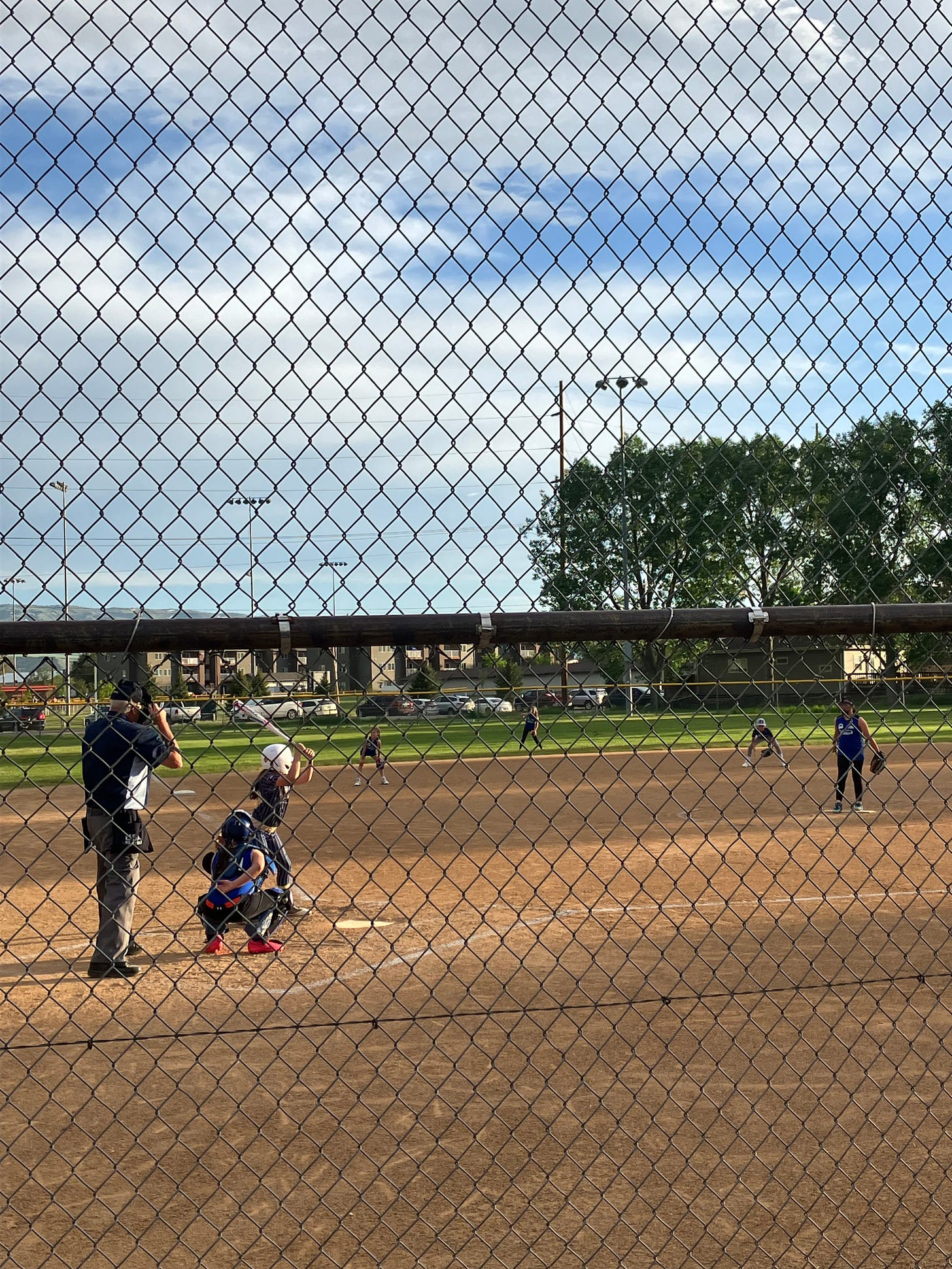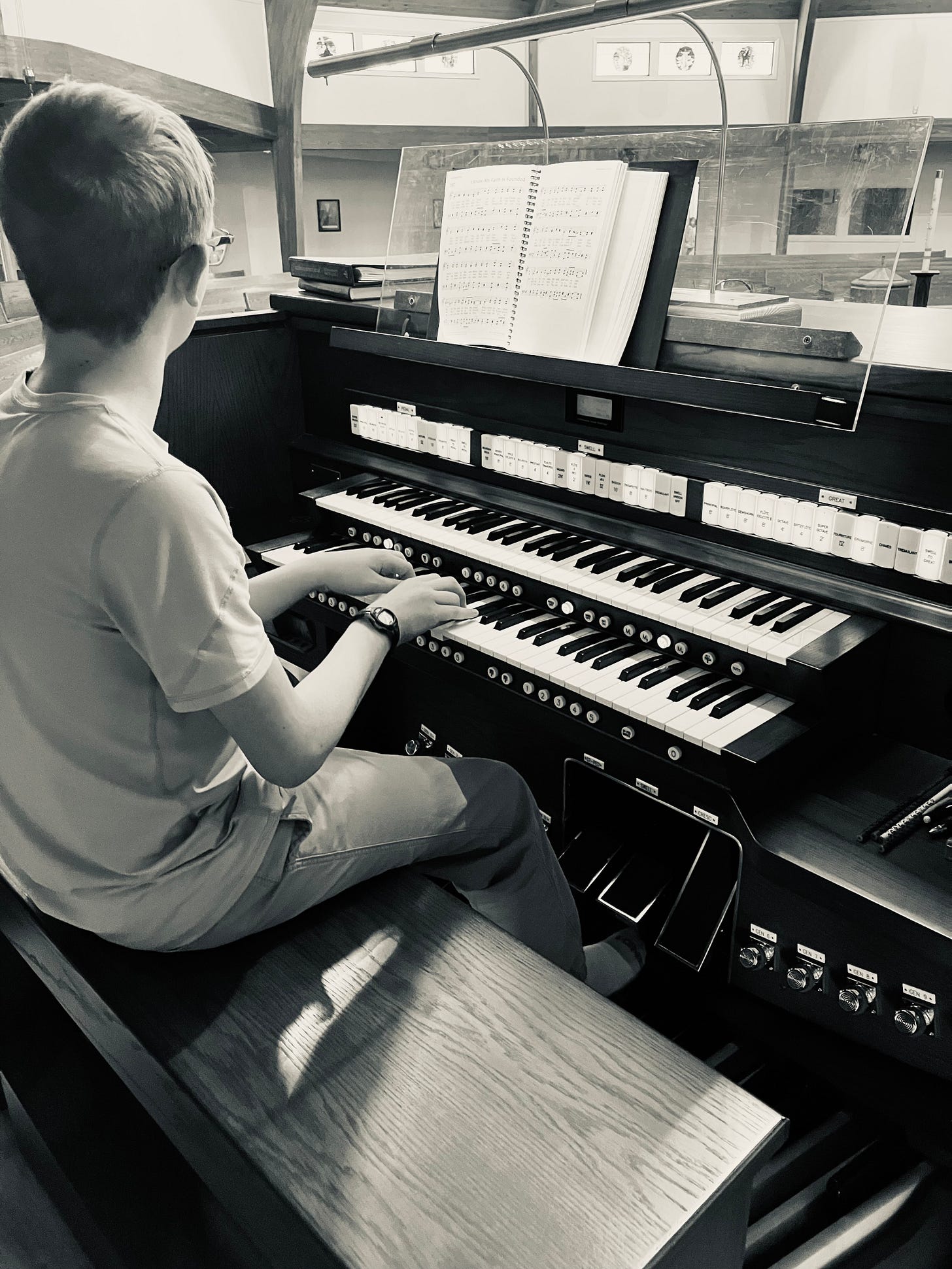The windows are open, the breeze is warm, and baseball season is back. We’re passionate amateurs here, frequently playing catch or hitting for fun. All our kids channel the old-time sandlot because they just plain like the game. Near the end of school, they invented a form of baseball that they call bunt ball, specifically so it can fit inside our postage-stamp-sized backyard. It’s heavy on hitting and running and light on fielding—the pitcher is the only defensive player. They play it for hours. One of the highlights happens when they let the two-year-old hold the bat, swing it at nothing, and run the bases for a home run. Then they lift him to their shoulders, cheering.
Our kids enjoy hearing and learning about baseball history, too, particularly our eldest son. A newly minted fifteen-year-old, he has been reading lots of baseball history in recent months. He devoured Game Six, a book about the legendary 1975 World Series match between the Reds and the Red Sox, and he loved it so much that he convinced me to watch an old broadcast of the game on YouTube with him. He also has pontificated at length about which players deserve to be named the best, or what rankings they should be. He considers Ty Cobb to be the best all-around player, but our son admits that Cobb is not his personal favorite player (Cobb was notoriously mean and could be downright brutal). He really likes Nolan Ryan, to the extent that he presented a rhetorical argument in waning school days asserting that Ryan deserves to be called the greatest MLB pitcher of all time. His teacher called his argument “very convincing.”

We’ve had conversations about what makes an honorable man, specifically referring to baseball players. Certain players who were fun and impressive to watch, like Pete Rose and Barry Bonds, we agree can be considered highly skilled. But they’re not the kind of men that should be imitated. Our son read Rose’s My Prison Without Bars with mixed feelings; he appreciates Rose’s many records and performances but admits his lack of honesty has left a huge black mark on his historical record. Other players, like Lou Gehrig and Albert Pujols, deserve our respect, for their stalwart tenacity and concomitant career achievements. Even more importantly, these men used their fame to benefit good causes, like ALS research and patient care and Downs Syndrome support.
Our family loves baseball, and many American sports. We also discuss the problems with it—the corporate, money-driven NFL/MLB/NBA behemoths, the collegiate rackets, the high school obsession, all the money and time from the professionals all the way down to local organizations of first-grade newbies. It’s too hard to miss, even in our daily lives. Our eldest daughter played 10U (ten and under, though she’s 11—that’s another story) rec league fast-pitch softball for fun this summer, and she loved it. But some of the teams her team played are travel teams, and in Wyoming, travel teams are no joke—they cost a lot and require many hours of driving, nights away from home, and the like. And these are girls who haven’t hit middle school yet.
Unfortunately, sports for too many people has become something of a religious experience. In our family, we point out the temptation to idolize sports that can be so easy to fall into in our culture. “What is most important?” we ask. That answer is clear—it’s Jesus Christ and what He has done for us. At the same time, we can still learn, as our children are learning, from sportsmen like Gehrig and Pujols who have demonstrated personal humility and have brought honor to their teams and to many others. We want to do the same in our ways and in our own circles.
Our oldest son is not an athlete, something he freely admits. He is a gifted musician, though, and we have seen in recent months how years of practice combined with incredible natural ability has begun to manifest in him, particularly on the organ. Our son has wanted to learn to play the organ for years. I took him to a professional organ recital when he was about five, and he was mesmerized the entire time. He started piano lessons at six and has continued lessons on and off since then, and he’ll reach his two-year anniversary of playing the organ later this month.
God has gifted our son with several highly helpful musical abilities. He has perfect pitch, which can be very helpful in choir (he’s a built-in pitch pipe) and music theory. During an end-of-year class showcase featuring student compositions, he raised his hand and pointed out that the program playing the student scores was off by a half-step. Teachers quickly realized he was right and fixed it. And sometime in the last year he’s gone from an obvious organ beginner to better than most church organists I’ve heard. One of our regular organists stepped out of the rotation in March to have a baby, and he was more than ready to step in. He improvises Offertories, plays many hymns from memory, and has mastered several Bach preludes. He’s currently learning Wachet Auf, one of his favorites.
As his parents, Jon and I are trying to emphasize to our son the difference between being cocky and being confident, that fine line between sinful pride and using his gifts with humility. (That’s one reason I’m not using his name here; the other is to protect his identity, at least a little.) Thankfully, he’s practicing that. When he changes key mid-hymn-stanza just to mess with us singers, we yell at him. When he plays “Jesus Christ is Risen Today” on the organ during Easter Sunrise service—well, we thank God.
As his mother, I try not to think about the fact that my son is playing during services now. Mainly, this is because when I see his head barely peeking over the organ console, his glasses reflecting the sanctuary lights, I see him at three, or seven, or ten, plugging away on the piano. In a small way, he’s reminded me of Corrie Ten Boom’s stories about her beloved nephew, Peter, in The Hiding Place. Corrie wrote about what happened while the family listened to a Brahms concerto during a radio concert. “Peter suddenly spoke up… ‘It’s funny they put a bad piano on the radio.’” Peter played a note on their parlor piano, and then they all realized that one of the keys on the concert grand was flat. Peter quickly exhausted Corrie’s musical ability and moved on to more advanced teachers. As a teenager, he won an organist position over forty other, older applicants.
But Peter’s shining moment in the book comes after the German occupation of Holland in 1940. Soldiers were omnipresent, and eventually it became illegal to sing the Dutch national anthem, the “Wilhelmus.” After the Reformed church service where Peter was playing, “[the] closing prayers were said. And then, electrically, the whole church sat at attention. Without preamble, every stop pulled out to full volume, Peter was playing the “Wilhelmus”!” Corrie, her family, and the rest of the congregation were brought to their feet.
Then we were all singing together, the full voice of Holland singing her forbidden anthem. We sang at the top of our lungs, sang our oneness, our hope, our love for Queen and country. On this anniversary of defeat it seemed almost for a moment that we were victors.
Peter went to jail for a few weeks and thankfully emerged unscathed, much to Corrie’s chagrined relief. He went on to participate in the Dutch Underground during the war. After the war, he and his wife and children toured Europe, performing music and confessing Christ.
One can’t draw a straight line from one mighty organ moment to helping Jews escape from the Nazis, but I daresay there’s a connection. Playing the organ for a congregation requires training, and patience, and attention. It needs leadership, as one Lutheran lady pointed out to our son. “Some organists follow, and others lead,” she said after one of the first times he played for a congregation. “You lead.” Congregants implicitly rely on the confidence of the organist. If you’ve ever been in a pew, listening to faltering notes from an unsure keyboardist and trying to join in, you’ll know what I mean. We are charitable to our live musicians because we appreciate them, and most of us couldn’t dream of doing what they do. We know they aren’t perfect. And we are extra thankful for those who know what they’re doing and play like they do. They forge ahead and hearten us pew-sitters. So while playing an anthem might not seem like a big deal, musicians especially know that it is. Music moves people. It reminds them of why they live and move. And Christian music at its best says to us what we need to say ourselves: Jesus is the most important, and He is our victor.
After the first Sunday Divine Service our son played, one usher told my husband, “Your son plays like a man.” And I had thought the same thing. I could point to his playing of St. Patrick’s Breastplate, how he drove the rhythm with the energy and crispness it demands, or how he used particular stops to highlight sections of the melody, or the sheer, shaking volume he put into this great confessing hymn. But mostly I mean that he played like it was the truest thing we could sing. He played like its words confessed Christ and His work absolutely clearly and absolutely for us, like a ball sailing high over an outfield for an undisputed home run that wins the game for our team.
We’ve spoken many times to our son about how music can encourage the faithful. His father has given him insights into how best an organist can assist a pastor who is chanting, or how to make transitions between parts of the service more seamless. Several good Lutheran kantors have provided him with lessons and great encouragement, as he is considering becoming a kantor. Whether or not our son formally trains as one, we want—and he wants—to serve God with the gifts He has given him. We pray that should he ever be tested, he can play like Peter van Woerden, like a young man unflinchingly playing a forbidden anthem to bring hope to believers and a strong confession of Christ’s victory that has no end.
As our son breaks in his fifteenth year, and as he mounts the bench and plays for another service, I pray he continues learning and serving. He has a long way to go, because he is still very young and inexperienced. So I pray to God that he plays with humility, always remembering to Whom he owes his life, his talent, and his salvation. I pray he continues to play with confidence, with the kind of chutzpa a young man carries without much question, the kind of magnetic assurance that inspires others, but mostly the kind of faith that only comes from the Holy Spirit. I pray the moment before his fingers land on the keys is like the moment a great baseball player steps up to the plate at a critical moment, the bat gently but firmly gripped in his hands, assured in what he’s doing and striving to do his absolute best with the skills he has, and joyful in the very act of playing. I pray he always believes the words of the hymns, and he plays the music, like his life depends on confessing through his fingers. I pray he continues to play like a man, to best confess the Man who did all for us.





